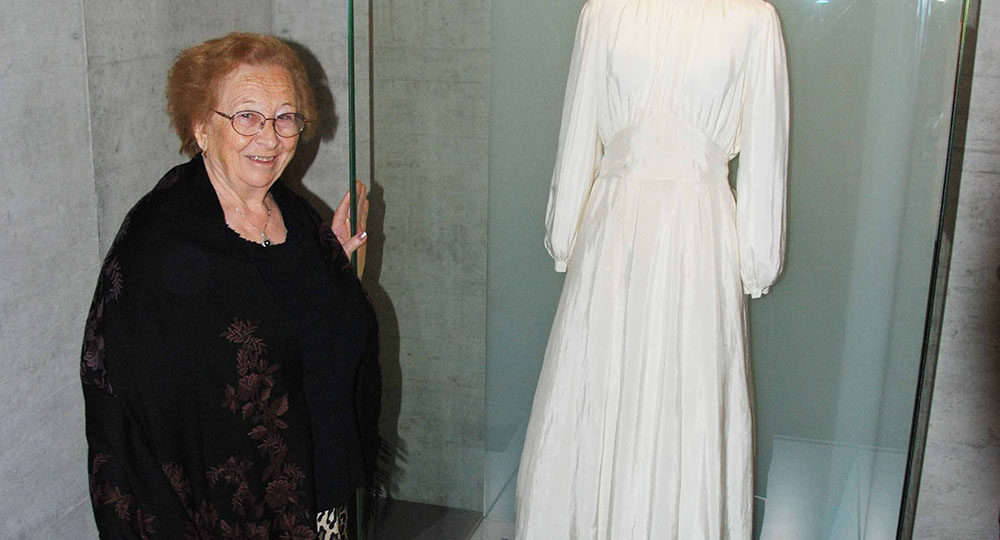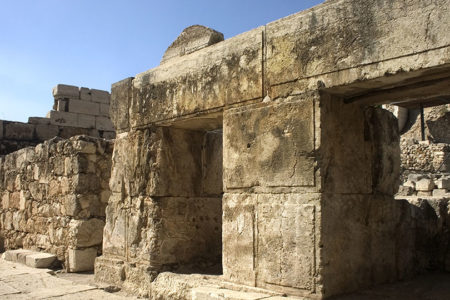When the World Descended Into Madness
Lilly Friedman lost virtually everything—parents, brothers, and home—during Hitler’s manic rampage through Europe during World War II. She survived the Auschwitz extermination camp and a forced-death march before ending her journey through Holocaust hell in the Bergen-Belsen concentration camp in Germany. She managed to survive; and her story survives, too, in the form of her wedding dress—a symbol of triumph over tragedy—fashioned from a German parachute and now permanently on display in the U. S. Holocaust Memorial Museum in Washington, DC.
As I read Helen Zegerman Schwimmer’s story of Lilly’s life in the darkness of the Shoah, her phrase when the world descended into madness hammered its way into my mind. I think it’s because of America’s plunge into political, moral, and social depravity over the past several years.
For generations we have been taught that, through some sort of social evolution, humanity is being swept upward into a utopian field of dreams. The theme was the mantra of “success” thinkers who peddled the notion “Every day, in every way, I’m getting better and better.”
We, of course, are not. The problem is that the philosophy was grounded in material success, self-love, “making it” in business and social circles, and believing that the basic component common to all was inherent goodness. These “thinkers” claimed mankind’s nature was universally disposed to altruism, benevolence, goodwill, and international harmony of thought and action capable of developing one brave new world of perpetual peace and prosperity.
The Fortunes of Fantasy
If such were true, why are we experiencing what appears to be an unprecedented increase in uncertainty, collective incompetence, and aggressive behavior? Why the obscenity of revisionist fantasy that degrades the accomplishments of truly great statesmen and turns every spectacular achievement of Western history into a criminal enterprise?And (at the top of the list) why are we countenancing the unconscionable atrocity of Holocaust denial?
Holocaust denial represents a union of the most despicable elements of human thought and deed. It degrades, devalues, and dehumanizes even our right to exist. In every respect, Holocaust denial is the very gutter of hate-mongering.
The question we must ask is this: With the fraternity of revisionist history and Holocaust denial growing, accompanied by the international groundswell of anti-Semitism and irrational animosity toward the State of Israel, are we nearing a repetition of the time when the world descended into madness?
Remembering Reality
A few years ago I stood with our beloved Zvi Kalisher, a Holocaust survivor, at the site of the Treblinka concentration camp in Poland, a killing factory that owned the distinction of murdering more Jewish people in less time than any other Nazi death camp. It was probably here that Zvi’s father, mother, and sister were “processed” after being moved from the Warsaw Ghetto.
At the far end of the camp is a large pit pockmarked by evidence of hand shoveling. After spending time in a garden where memorial stones, equal in number to the slain, cover the spot where the crematory once stood, we saw the pit. It deepened the reality of what happened in that dreadful place. Like the ovens at Auschwitz, there stood the physical evidence of what went on. Every shovelful of earth was dug by a Jewish man or boy who, after being worked nearly to death, was disposed of in the ash pits where human remains were dumped.
I have seen, many times over, the faded numbers on the arms of survivors who, though they made it through, had their lives inconceivably crushed by their encounter with the incomprehensible.
American Gen. Dwight Eisenhower did the right thing by ordering residents from nearby towns and villages to walk by the piles of human remains to witness what they had refused to acknowledge. He also made young GIs enter the gates and look at what had been done. He reasoned correctly they would return home bearing eyewitness accounts with confirming photographs of what we must never forget. The general was farsighted enough to see that, one day, people would choose to forget.
Some might question whether pushing aside unpleasant chapters of history is a choice or a simple casualty of the passing of time. And while time does put distance between events and recollections, the fact is that the vast majority of people do not wish to be reminded of man’s unthinkable cruelty to man.
A recent example was heard in the voices of those offended by video reruns of the collapse of the Twin Towers on September 11, 2001. Their preference was to put the atrocity out of mind and move on. We must, of course, move on; but doing so does not justify ignoring the reality of the events.
Anyone who has ever ascended to the top of Masada near the Dead Sea has been exposed to a gruesome calamity that befell the Jewish people some 2,000 years ago. It was Rome’s final act in its quest to obliterate the Chosen People. The invaders had ravished Jerusalem, and the Jews fled and scattered. Nearly 1,000 refugees made their way to the fortress in the desert in an effort to escape the fury of the Romans. After three grueling years of siege and attacks, Masada fell; and the refugees died.
But after two millennia, the event has not been forgotten. It’s as though the memory rides the desert winds, passing over the plateau and keeping it alive. Masada’s message lives in words repeated to this day: Masada shall not fall again! In a very real way, that declaration is the seedbed of Israel’s tenacious struggle for survival. Forgetting is not an option.
Out of Death Comes Life
I once asked a Jewish immigrant to Israel why she left the safety of England to make her home in a settlement where everyone was in constant danger of being attacked. She replied that her life was in the homeland of her people and that she would rather be part of the Jewish dream to rebuild the country than live quietly in Great Britain.
I reminded her she was placing her life in daily jeopardy. When I asked whether she felt the risk was worth it, she replied,
Yes, I am aware of that. And I choose to remain because I truly believe that, if I should lose my life here, out of my death new life will come. Everyone here believes the same. It doesn’t matter how many times this place is destroyed by our enemies, we will build it again. And one day death will be overcome, and life will flourish here.
And though the concept is difficult to grasp in hard times, it is the true nature of things.
Accompanying the article on the remarkable life of Lilly Friedman was a poignant photograph. Resting on an Israeli flag draped over a table, slightly above the point of the flag’s Magen David, is a wrinkled forearm bearing the faded blue numbers 55374. The Nazis identified their extermination-camp victims by numbers and tattooed the numbers on them.
The tattoo is a witness to history—a history of suffering and unmitigated evil the likes of which the modern world has rarely seen. It also gives evidence of a commitment to destroy an entire people—a “final solution.”
But a simple photograph belies that colossal hallucination. For resting on the hand of the aged forearm is that of a small child, very much alive. That little hand epitomizes life and promise for the future. There was no final solution, nor will there ever be. Evil empires, as the late President Ronald Reagan once called the totalitarian Soviet Union, have a short shelf life.
Eyeballing a New Year
Recurrent periods of national and international trauma only confirm the cycles of history long since forecast in the Holy Scriptures, which tell us emphatically that there will be an end to evil. Every national tribulation or personal trial is a gateway to better things—things that are not the stuff delivered by progressive politicians or feel-good, New Age theological hirelings. Such people avoid unsettling unpleasantness that might upset congregants who are overly sensitive to archaic concepts like sin and its consequences.
Few with their faculties about them will deny we have been through a tough few years. Even now the revolution continues, determined to bring down America and the West and return to the burned-out failures of old socialist/Marxist empires.
And let’s be honest: The successes, and even the near misses of recent vintage, have only fired the determination of liberal revolutionaries to take it all the way. They believe their grand opportunity has come and that they can’t afford to blow it. What does this fact portend for people who revere our Judeo-Christian worldview and lifestyle?Hard times ahead. Perhaps even the equivalent of when those numbers, still visible on the forearms of survivors, were tattooed.
So what advice can we give to those who are serious about the future and understand what we are up against?Three simple imperatives:
- Remember. Israel was under constant admonition from Jehovah to remember. Looking back was a chart to the future. It is the same for us. Those who wish to hear only the pleasant are doomed to become victims of the horrific.
- Return. Get back to the Book. There could be no more straightforward advice than this. Replacement Theology has been a tragic source of delusion to this generation of Christians. Knowing sound, sensible, Bible prophecy is the only indisputable key to the future that will instill the discernment indispensible to life in this turbulent era.
- Retell. A dictionary definition of revival, in addition to “a period of renewed religious interest,” is “a new presentation or publication of something old.” The thought brings to mind a 19th-century hymn with the lyric “Tell me the old, old story of Jesus and His love.” We need to retell that story over and over again in hopes that God will use it for revival to change the hearts of unregenerate mankind. Our obsessive quest for something new has been a stumbling block.
Israel is sometimes called “a new old land.” That’s a perfect description of the reality of Israel. The new state sprang from the old. Will it be said that a rebirth of spiritual commitment and vitality sprang from the old truths and roots of godly living? Only we can answer that question.
Remember the child’s hand on the arm of the Holocaust survivor? In a way, it reminds me of the Lord’s promise: “Behold, I make all things new” (Rev. 21:5). That’s the future in six words.







